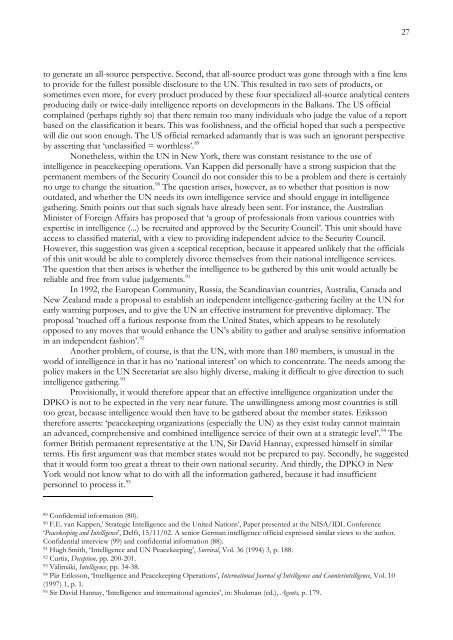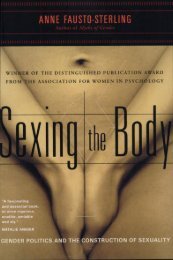C. Wiebes - Intelligence en de oorlog in Bosnië 1992-1995. De rol van de inlichtingen- en veiligheidsdiensten - Engels
C. Wiebes - Intelligence en de oorlog in Bosnië 1992-1995. De rol van de inlichtingen- en veiligheidsdiensten - Engels
C. Wiebes - Intelligence en de oorlog in Bosnië 1992-1995. De rol van de inlichtingen- en veiligheidsdiensten - Engels
- No tags were found...
You also want an ePaper? Increase the reach of your titles
YUMPU automatically turns print PDFs into web optimized ePapers that Google loves.
27to g<strong>en</strong>erate an all-source perspective. Second, that all-source product was gone through with a f<strong>in</strong>e l<strong>en</strong>sto provi<strong>de</strong> for the fullest possible disclosure to the UN. This resulted <strong>in</strong> two sets of products, orsometimes ev<strong>en</strong> more, for every product produced by these four specialized all-source analytical c<strong>en</strong>tersproduc<strong>in</strong>g daily or twice-daily <strong>in</strong>tellig<strong>en</strong>ce reports on <strong>de</strong>velopm<strong>en</strong>ts <strong>in</strong> the Balkans. The US officialcompla<strong>in</strong>ed (perhaps rightly so) that there rema<strong>in</strong> too many <strong>in</strong>dividuals who judge the value of a reportbased on the classification it bears. This was foolishness, and the official hoped that such a perspectivewill die out soon <strong>en</strong>ough. The US official remarked adamantly that is was such an ignorant perspectiveby assert<strong>in</strong>g that ‘unclassified = worthless’. 89Nonetheless, with<strong>in</strong> the UN <strong>in</strong> New York, there was constant resistance to the use of<strong>in</strong>tellig<strong>en</strong>ce <strong>in</strong> peacekeep<strong>in</strong>g operations. Van Kapp<strong>en</strong> did personally have a strong suspicion that theperman<strong>en</strong>t members of the Security Council do not consi<strong>de</strong>r this to be a problem and there is certa<strong>in</strong>lyno urge to change the situation. 90 The question arises, however, as to whether that position is nowoutdated, and whether the UN needs its own <strong>in</strong>tellig<strong>en</strong>ce service and should <strong>en</strong>gage <strong>in</strong> <strong>in</strong>tellig<strong>en</strong>cegather<strong>in</strong>g. Smith po<strong>in</strong>ts out that such signals have already be<strong>en</strong> s<strong>en</strong>t. For <strong>in</strong>stance, the AustralianM<strong>in</strong>ister of Foreign Affairs has proposed that ‘a group of professionals from various countries withexpertise <strong>in</strong> <strong>in</strong>tellig<strong>en</strong>ce (...) be recruited and approved by the Security Council’. This unit should haveaccess to classified material, with a view to provid<strong>in</strong>g <strong>in</strong><strong>de</strong>p<strong>en</strong>d<strong>en</strong>t advice to the Security Council.However, this suggestion was giv<strong>en</strong> a sceptical reception, because it appeared unlikely that the officialsof this unit would be able to completely divorce themselves from their national <strong>in</strong>tellig<strong>en</strong>ce services.The question that th<strong>en</strong> arises is whether the <strong>in</strong>tellig<strong>en</strong>ce to be gathered by this unit would actually bereliable and free from value judgem<strong>en</strong>ts. 91In <strong>1992</strong>, the European Community, Russia, the Scand<strong>in</strong>avian countries, Australia, Canada andNew Zealand ma<strong>de</strong> a proposal to establish an <strong>in</strong><strong>de</strong>p<strong>en</strong>d<strong>en</strong>t <strong>in</strong>tellig<strong>en</strong>ce-gather<strong>in</strong>g facility at the UN forearly warn<strong>in</strong>g purposes, and to give the UN an effective <strong>in</strong>strum<strong>en</strong>t for prev<strong>en</strong>tive diplomacy. Theproposal ‘touched off a furious response from the United States, which appears to be resolutelyopposed to any moves that would <strong>en</strong>hance the UN’s ability to gather and analyse s<strong>en</strong>sitive <strong>in</strong>formation<strong>in</strong> an <strong>in</strong><strong>de</strong>p<strong>en</strong>d<strong>en</strong>t fashion’. 92Another problem, of course, is that the UN, with more than 180 members, is unusual <strong>in</strong> theworld of <strong>in</strong>tellig<strong>en</strong>ce <strong>in</strong> that it has no ‘national <strong>in</strong>terest’ on which to conc<strong>en</strong>trate. The needs among thepolicy makers <strong>in</strong> the UN Secretariat are also highly diverse, mak<strong>in</strong>g it difficult to give direction to such<strong>in</strong>tellig<strong>en</strong>ce gather<strong>in</strong>g. 93Provisionally, it would therefore appear that an effective <strong>in</strong>tellig<strong>en</strong>ce organization un<strong>de</strong>r theDPKO is not to be expected <strong>in</strong> the very near future. The unwill<strong>in</strong>gness among most countries is stilltoo great, because <strong>in</strong>tellig<strong>en</strong>ce would th<strong>en</strong> have to be gathered about the member states. Erikssontherefore asserts: ‘peacekeep<strong>in</strong>g organizations (especially the UN) as they exist today cannot ma<strong>in</strong>ta<strong>in</strong>an ad<strong>van</strong>ced, compreh<strong>en</strong>sive and comb<strong>in</strong>ed <strong>in</strong>tellig<strong>en</strong>ce service of their own at a strategic level’. 94 Theformer British perman<strong>en</strong>t repres<strong>en</strong>tative at the UN, Sir David Hannay, expressed himself <strong>in</strong> similarterms. His first argum<strong>en</strong>t was that member states would not be prepared to pay. Secondly, he suggestedthat it would form too great a threat to their own national security. And thirdly, the DPKO <strong>in</strong> NewYork would not know what to do with all the <strong>in</strong>formation gathered, because it had <strong>in</strong>suffici<strong>en</strong>tpersonnel to process it. 9589 Confid<strong>en</strong>tial <strong>in</strong>formation (80).90 F.E. <strong>van</strong> Kapp<strong>en</strong>,’ Strategic <strong>Intellig<strong>en</strong>ce</strong> and the United Nations’, Paper pres<strong>en</strong>ted at the NISA/IDL Confer<strong>en</strong>ce‘Peacekeep<strong>in</strong>g and <strong>Intellig<strong>en</strong>ce</strong>’, <strong>De</strong>lft, 15/11/02. A s<strong>en</strong>ior German <strong>in</strong>tellig<strong>en</strong>ce official expressed similar views to the author.Confid<strong>en</strong>tial <strong>in</strong>terview (99) and confid<strong>en</strong>tial <strong>in</strong>formation (88).91 Hugh Smith, ‘<strong>Intellig<strong>en</strong>ce</strong> and UN Peacekeep<strong>in</strong>g’, Survival, Vol. 36 (1994) 3, p. 188.92 Curtis, <strong>De</strong>ception, pp. 200-201.93 Välimäki, <strong>Intellig<strong>en</strong>ce</strong>, pp. 34-38.94 Pär Eriksson, ‘<strong>Intellig<strong>en</strong>ce</strong> and Peacekeep<strong>in</strong>g Operations’, International Journal of <strong>Intellig<strong>en</strong>ce</strong> and Counter<strong>in</strong>tellig<strong>en</strong>ce, Vol. 10(1997) 1, p. 1.95 Sir David Hannay, ‘<strong>Intellig<strong>en</strong>ce</strong> and <strong>in</strong>ternational ag<strong>en</strong>cies’, <strong>in</strong>: Shukman (ed.), Ag<strong>en</strong>ts, p. 179.





